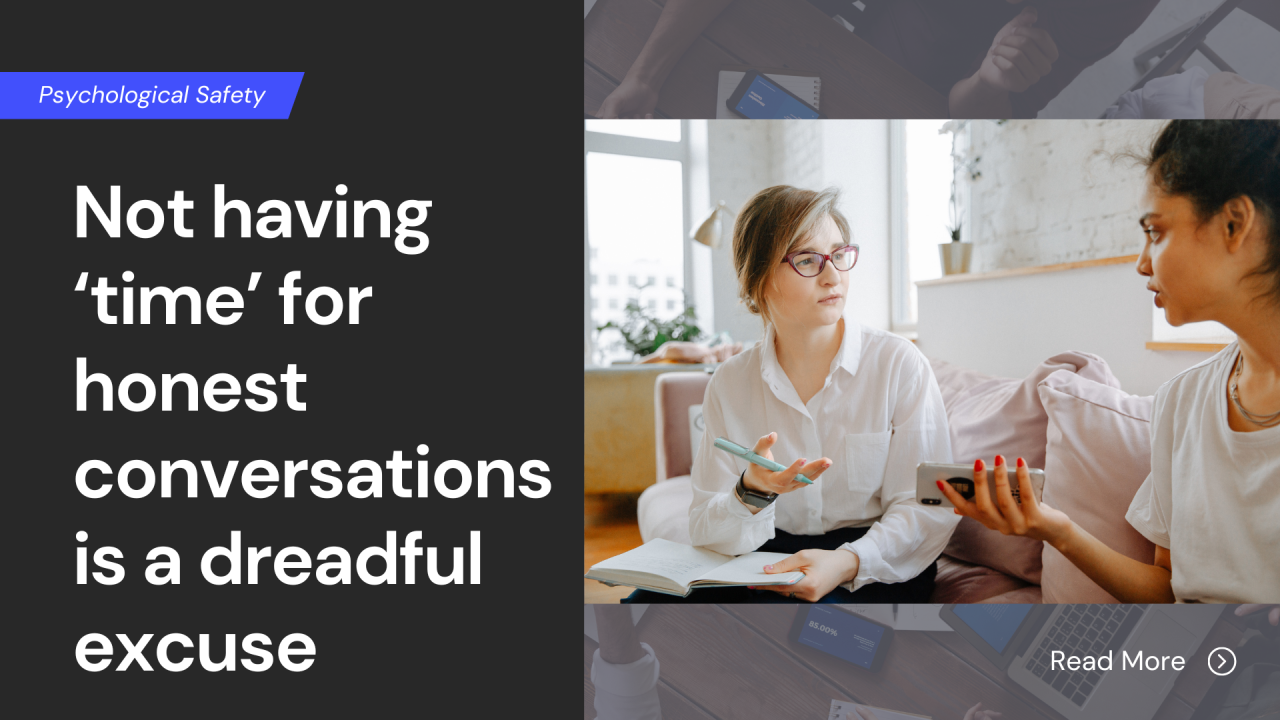Not having ‘time’ for honest conversations is a dreadful excuse

I am going to keep this short, because giving feedback does not have to take time.
In breakthrough sessions I run on how teams connect better for high performance, the topic of being more honest, giving feedback and managing difficult conversations always comes up. The desire to take ‘corrective action’, ‘address poor behaviours’, ‘be clear on the standards we expect’ is strong amongst senior leaders….but something gets in the way.
“What’s the barrier?”, I ask. The answer, ‘time’. The most senior leaders I work with all reference not having time to do this. Next question…”what’s the benefit?”. It “helps people grow”, “sets standards”, “supports development”, “prevents escalation to more serious performance issues”. Next intervention, “so you’re telling me you don’t have time to support people’s growth and development, make it clear the behaviours you expect and ones you won’t accept”. This is met with silence…and perhaps the penny dropping.
The real barrier is not time, it’s fear. It’s concern for the reaction we will get, and I get this. However, in my experience, if you deliver the feedback with care, clarity, and in a timely manner, it can go well. I learned this from the brilliant Jason Rosoff at Radical Candor®. And it’s an approach I took with a senior leadership team during a breakthrough session recently.
Let me be clear, I was really nervous doing this but I felt it was necessary. It happened around 90 minutes into a session with nine leaders, half of which turned up 15 minutes late for the session. We were discussing how honest feedback is critical to building culture, however it is difficult because “we don’t have time”. So I gambled. I asked it they wanted some feedback. To this point I’d mentioned nothing about some of them being late to the meeting….here’s how it played out…
I started by asking if they would like some feedback as a team…they consented saying “yes”. Then I asked them to look at their watches and time how long this took. Here’s what I said…”you are a really important client to me. I feel privileged to be working with you. I have prepared for this session within an inch of my life and I have made a promise to finish by 1230. Half of you arrived 15 minutes late. This has created a lot of anxiety for me in terms of what we need to get through so I can keep my promise to finish on time. Internally I have been debating how to adjust, so we deliver on our objective for the session, ensure everyone is heard and enable you to get on to the next item on your busy agenda. So I’d really appreciate it if when we go to a break you please come back at the agreed time….and if we have another session like this in the future we kick off on time’.
Their reactions, “that was 35 seconds well spent”; “you made it clear the impact of us being late on you”; “that was very reasonable feedback, objective and I know what to do next time”, “that did not take long, as he said, 35 seconds”; “thanks for sharing that feedback in a timely manner, it made it super clear and specific”.
If feedback is to be part of your culture, part of the tone you set, my recommendation is make time, exercise this muscle, ensure it is part of every day and remember this format can be used for positive reinforcement not just challenging conversations.
